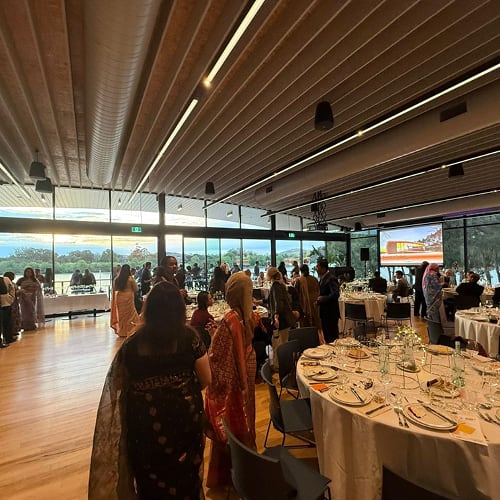RSM in Canberra were deeply honoured to sponsor the SiTara's Story Together at Twilight annual fundraising gala in October 2025.
During the night, guests we were inspired by Marisa Paterson MLA, the High Commissioner for the People's Republic of Bangladesh, Craig Foster AM, Rashedul "Rashie" Hasan, co-owner and executive chef at OGNI, Nazia Ahmed, music from Ferari, and Dr Shamaruh Mirza the founder of Sitara's Story.
RSM in Canberra is committed to supporting community leaders who drive positive change and SiTara's Story is a remarkable local non-profit organisation that truly believes strong women build strong communities and nations.
Mehnaz Huq and Kirsty McGovern-Hooley had an insightful coffee catch-up with the founder of SiTara’s Story, Dr Shamaruh Mirza, where she shared the deeply personal and transformative journey behind the creation and growth of the organisation.
Origins: From personal experience to collective action
Dr Mirza’s journey began with her own migration from Bangladesh to Australia. Despite her professional qualifications and ability to integrate into Australian society, she noticed a profound void—one that many migrant women experience. She observed that, unlike herself, many women faced significant barriers such as language difficulties, domestic violence, cultural and religious stigma, and, most critically, a lack of safe spaces to share their stories and seek support.
A pivotal moment came when a close friend, overwhelmed by mental health struggles, attempted to take her own life. This incident highlighted the silence and stigma surrounding mental health in migrant communities. Dr Mirza realised the urgent need for culturally sensitive support and safe spaces for women to express themselves and begin their journey toward empowerment.
Building SiTara’s Story: Safe spaces and cross-border advocacy
SiTara’s Story was founded to address these gaps. Its mission is to provide a safe, welcoming environment where women can share their experiences, access resources, and build resilience. The organisation’s work quickly expanded beyond Australia, recognising similar needs in rural Bangladesh, where mental health remains a taboo subject and services are scarce.
One particularly moving story that shaped Sitara Story’s advocacy was that of a 14-year-old Bangladeshi girl who, after being publicly humiliated for not paying a small exam fee, took her own life. This tragedy underscored the urgent need for mental health education and support for adolescents in Bangladesh.
SiTara’s Story now runs workshops on mental health, financial literacy, and cultural intelligence, as well as skills development and social research in Canberra. They also run mental health advocacy programs in both urban and rural Bangladesh. These initiatives reach diverse groups, including children of sex workers and other marginalised communities.
Vision for the future: Expanding impact
Looking ahead, Dr Mirza envisions SiTara’s Story expanding its cross-border programs to countries like Pakistan and India, where similar cultural and social barriers exist. The approach involves partnering with local organisations—such as the Innovation for Wellbeing Foundation in Bangladesh—to implement, monitor, and audit projects, ensuring robust governance and sustainable impact.
Challenges faced by migrant communities
The conversation also delved into the unique challenges faced by migrants, particularly women, in Australia:
- Breaking Isolation: The first hurdle is often simply leaving the house to access support, overcoming both cultural and psychological barriers.
- Financial Control: Many migrant women experience financial abuse or coercive control, rooted in cultural norms from their countries of origin.
- Intergenerational Gaps: Children of migrants often navigate two worlds, balancing their parents’ cultural values with those of their new home, leading to identity conflicts.
- Entrepreneurship Barriers: Migrant women are less likely to pursue entrepreneurial ventures, often due to risk aversion and lack of support.
- Cultural Competency in Services: There is a shortage of government and mental health services tailored to the cultural backgrounds of migrants, making it difficult for them to access effective support.
Collaboration and community engagement
The model that SiTara’s Story follows is highly collaborative, working with partner organisations in each country to deliver programs. The organisation welcomes involvement from individuals and companies—whether through direct participation, funding, or sharing expertise. RSM’s presence in Bangladesh and its global network present opportunities for further collaboration, including financial education workshops and professional services tailored to migrant needs.
Conclusion
SiTara’s Story stands as a testament to the power of lived experience, empathy, and cross-cultural collaboration. Through its workshops, advocacy, and partnerships, it is breaking down barriers, fostering resilience, and empowering women and communities across borders. As Dr Mirza and her team look to the future, their vision is clear: to expand their impact, challenge stigma, and build bridges of support wherever they are needed most.
For more information or to get involved with SiTara’s Story, reach out to Dr Shamaruh Mirza or visit the organisation’s website. RSM in Canberra is proud to support initiatives that drive social change and empower communities worldwide.
VIEW THE EVENT PHOTOS BELOW:
|







